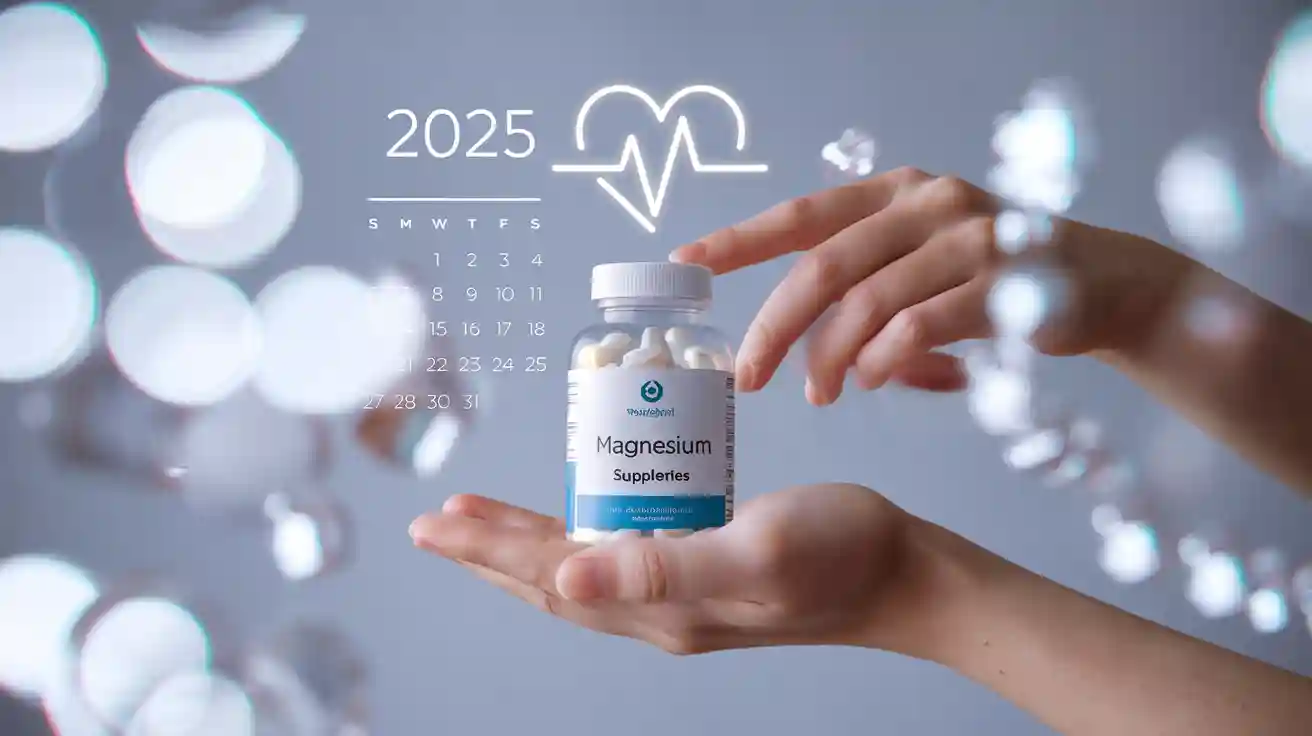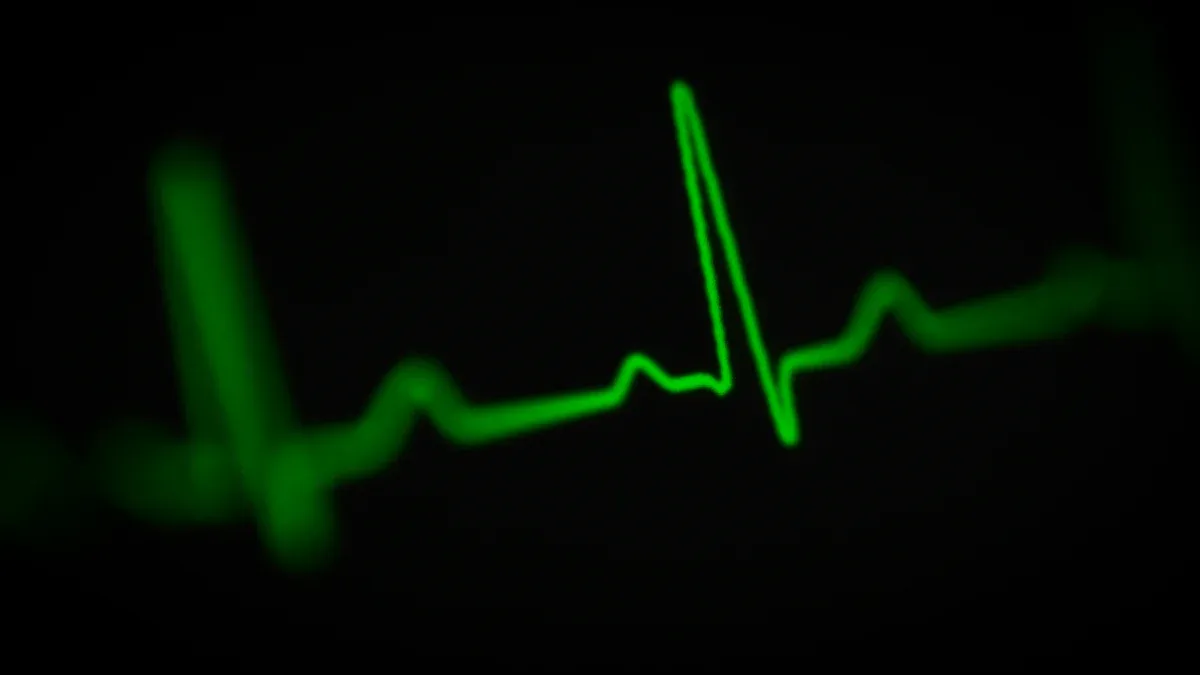Can Magnesium Supplements Ease Tachycardia in 2025?
Table of Contents

You might wonder if magnesium supplements really help with tachycardia in 2025. Recent studies show that they can lower the risk of certain fast heart rhythms. Check out how common these heart issues are today:
| Condition | Prevalence/Incidence | Year |
|---|---|---|
| Atrial Fibrillation | Estimated to increase to 12.1 million people | 2025 |
| PSVT | About 1.26 million people in the US | 2025 |
Doctors have found that magnesium helps many people with arrhythmias, especially if other medicines do not work. You should always consider safety and talk to your doctor before trying any new supplement.
What Is Tachycardia?

Tachycardia means your heart beats faster than normal when you are at rest. Doctors say a resting heart rate of 100 beats per minute or more counts as tachycardia. You might hear about two main types. Supraventricular tachycardia starts in the upper chambers of your heart, while ventricular tachycardia begins in the lower chambers. Both types can make your heart work harder than it should.
Symptoms
You may notice some signs when your heart races. Common symptoms include:
- Feeling your heart pounding or fluttering
- Shortness of breath
- Dizziness or lightheadedness
- Chest pain
- Fatigue
Sometimes, you might not feel anything at all. Your heart can speed up because of stress, dehydration, fever, or even too much caffeine. Exercise and alcohol use also play a role. If you have arrhythmias, you may notice these symptoms more often.
Tip: If you feel dizzy or faint, sit down right away and let someone know. Fast heartbeats can sometimes lead to serious problems.
Risks
Tachycardia can cause trouble if you ignore it. Your heart may not pump blood well, which can lead to fainting or even heart failure. Some risks include:
- Hemodynamic instability (your blood pressure drops suddenly)
- Cardiomyopathy (your heart muscle gets weak)
- Heart failure
- Sudden cardiac death
Other health problems like high blood pressure, anemia, lung disease, or hyperthyroidism can make arrhythmias worse. You should talk to your doctor if you notice symptoms or have other heart issues. Quick action helps prevent bigger problems down the road.
Magnesium and Heart Rhythm

How Magnesium Works
You might not think about minerals when you picture a strong, steady heartbeat. Magnesium plays a big role in keeping your heart health on track. It helps your heart cells work together by controlling how they send electrical signals. Magnesium stabilizes the cell membranes and keeps the sodium-potassium pump running smoothly. This pump moves sodium and potassium in and out of your heart cells, which helps your heart beat in a regular pattern.
Take a look at how magnesium affects your heart at the cellular level:
| Evidence | Description |
|---|---|
| Magnesium’s Role in Ionic Channels | Magnesium controls calcium, potassium, and sodium channels. This affects how your heart responds and how long each heartbeat lasts. |
| Effects of Hypomagnesemia | If you have magnesium deficiency, your heart rate can speed up. This happens because sodium channels become more active, which may cause tachyarrhythmias. |
| Effects of Hypermagnesemia | Too much magnesium slows your heart rate and can help keep your heart’s electrical activity stable. |
| Magnesium and Coronary Vessel Function | Magnesium stops spasms in your heart’s blood vessels and helps control blood pressure. |
| Magnesium’s Antagonistic Effects | Magnesium competes with calcium, which helps prevent your heart vessels from tightening too much. |
Magnesium also activates ATPase, an enzyme that powers the sodium-potassium pump. Without enough magnesium, your heart cells can’t keep their balance, and your heart health may suffer.
Deficiency Effects
Magnesium deficiency can make your heart rhythm go off track. If you don’t get enough magnesium, your sodium-potassium pump slows down. Sodium builds up inside your heart cells, and the membrane potential changes. This can lead to irregular heartbeats and even tachycardia.
Here are some ways magnesium deficiency can affect your heart:
- Your heart loses its ability to keep a healthy heart rhythm.
- Low magnesium levels reduce the pump’s activity, so potassium drops and sodium rises inside cells.
- You might develop hypokalemia (low potassium) or hypocalcemia (low calcium), which can make arrhythmias worse.
- Magnesium helps stop calcium overload in heart cells, which keeps your heart’s electrical system stable.
- If you have magnesium deficiency, your heart tissue can become inflamed, making arrhythmias more likely.
- The action potential in your heart cells gets disturbed, so your heartbeat can become irregular.
Doctors say that keeping your magnesium levels in a healthy range is important for heart health. If you notice symptoms like a racing heart or feel tired often, you should talk to your doctor. They can check if magnesium deficiency is causing your problems and help you find ways to support a healthy heart rhythm.
Magnesium Supplements for Tachycardia
Who Needs Magnesium Supplements
You might wonder if you need magnesium supplements for your heart. People with low magnesium levels often face more trouble with arrhythmias. If you have symptoms like muscle cramps, fatigue, or a racing heart, your doctor may check your magnesium. Some people cannot get enough magnesium from food, even when they try. You may need magnesium from supplements if you have chronic conditions, take certain medications, or have trouble absorbing nutrients.
Doctors often recommend supplements for arrhythmia when blood tests show low magnesium levels. You may also need them if you have heart failure, diabetes, or kidney problems. Children who have heart surgery sometimes get magnesium supplements to prevent tachycardia. In one study, kids who received magnesium had fewer fast heartbeats after surgery compared to those who did not. Adults with stable heart health may also benefit, especially if they struggle to keep their magnesium up through diet alone.
You can find many forms of magnesium supplements. Magnesium citrate, gluconate, and glycinate work best for absorption and tolerance. If you keep having arrhythmias or your magnesium stays low, your doctor may suggest these types. Supplements for arrhythmia help your heart muscles relax and support healthy heart rhythms. They also move potassium and sodium across your heart cells, which keeps your heartbeat steady.
Note: Always talk to your doctor before starting magnesium supplements. You need to make sure they fit your health needs and do not interact with your other medicines.
Research and Expert Views
You probably want to know if magnesium supplements really work for tachycardia. Many studies show that magnesium helps control fast heart rhythms, especially when other treatments do not work. Doctors use intravenous magnesium to treat dangerous arrhythmias like torsade de pointes. For rapid atrial fibrillation, doses between 1.2 and 10 grams of magnesium sulfate have proven safe and effective.
Let’s look at how magnesium supplements compare to other treatments:
- Intravenous magnesium works well for torsade de pointes.
- Oral magnesium supplements lower the number of silent ventricular arrhythmias in people with stable heart health.
- Doctors often use magnesium when standard treatments fail.
You can see more details in this table:
| Study Type | Findings | Conclusion |
|---|---|---|
| Meta-analysis of RCTs | Magnesium supplements protect against atrial fibrillation after surgery. | Good for specific groups, like heart surgery patients. |
| Observational studies | Results vary; some show no benefit or even opposite effects. | Not enough support for routine use outside surgery. |
Cardiologists say magnesium supplements help patients with tachycardia, especially those with ventricular tachyarrhythmias. Even people with normal magnesium levels sometimes respond well to magnesium therapy. If you have low magnesium levels or keep having arrhythmias, your doctor may recommend magnesium sulfate infusions when other treatments do not work.
Randomized trials show that daily oral magnesium supplements for arrhythmia are safe and well-tolerated. Most people stick with the treatment, but some report stomach changes. Magnesium supplements for arrhythmia can lower the risk of supraventricular arrhythmias by 23%, atrial fibrillation by 29%, and ventricular arrhythmias by 48%. They do not change how long you stay in the hospital or your risk of heart attack or death.
Magnesium supplements help children after heart surgery, too. In one study, kids who got magnesium had zero cases of junctional ectopic tachycardia, while 27% of kids in the placebo group developed it. The magnesium group kept normal levels after surgery, which helped their heart health.
You may wonder about the latest advancements. New studies show that long-term magnesium supplements lower the risk of heart failure and major heart events, especially in people with diabetes. Magnesium supplements also reduce arterial stiffness, which may help your heart health in the long run.
You should know that getting enough magnesium from food is important. Studies show that low magnesium levels from poor diet can cause heart rhythm problems like atrial flutter and atrial fibrillation. While supplements for arrhythmia help some people, experts say dietary magnesium works better for most. If you have high blood pressure or arrhythmias, you should focus on keeping your magnesium levels up through food first.
Tip: If you keep having arrhythmias or your magnesium stays low, ask your doctor about magnesium supplements. They can help you decide if supplements for arrhythmia are right for you.
Supplementation Safety
Dosage
You want to make sure you take the right amount of magnesium for your heart health. Doctors use different doses depending on your condition. For adults with atrial tachycardia, the usual dose is 3 to 4 grams given by IV over 30 seconds. This treatment is only for special cases when other methods do not work and there is no heart muscle damage. Always use caution with high doses.
| Condition | Usual Adult Dose |
|---|---|
| Atrial Tachycardia | 3 to 4 grams (IV, 10% solution) over 30 seconds. Use with extreme caution. Only if other methods fail and no heart muscle damage. |
If you use over-the-counter magnesium, start with the lowest dose. Some forms, like magnesium taurate or effervescent tablets, absorb better and may be easier on your stomach. Remember, more is not always better for heart health.
Side Effects
Most people handle magnesium supplements well, but you might notice some side effects. These can depend on the dose and your health. Here are the most common ones:
| Side Effect | Description |
|---|---|
| Gastrointestinal discomfort | Diarrhea, nausea, or stomach cramps, often if you take too much. |
| Renal implications | Can affect your kidneys, especially if you already have kidney problems. |
| Blood pressure changes | You may feel dizzy or lightheaded if your blood pressure drops. |
| Metabolic effects | Sometimes improves insulin sensitivity, but may cause low blood sugar in some people. |
| Cardiovascular effects | Effects can change based on your health, and not everyone sees a benefit. |
Tip: If you notice nausea, diarrhea, or muscle weakness, lower your dose or talk to your doctor.
When to See a Doctor
You should always check with your doctor before starting magnesium supplements, especially if you have heart disease, diabetes, or kidney problems. Some medicines, like blood pressure pills or diuretics, can interact with magnesium. Your doctor can help you avoid problems and keep your heart health on track.
-
Talk to your doctor if you have:
- Kidney disease
- Diabetes
- Intestinal disease
- Heart disease
-
Watch for signs of too much magnesium:
- Nausea or vomiting
- Low blood pressure
- Muscle weakness
- Fatigue
People with kidney disease can build up too much magnesium, which may cause headaches, confusion, or even serious heart problems. If your blood magnesium is high, you should not take supplements. Always let your doctor know about any new symptoms or changes in your health.
You have seen that magnesium supplements may help some people with fast heartbeats, but results can be mixed. Check out this table from recent studies:
| Study Title | Conclusion |
|---|---|
| Evaluating the effect of magnesium supplementation and cardiac arrhythmias after acute coronary syndrome: a systematic review and meta-analysis | Magnesium sulfate can be used safely and effectively to prevent ventricular and supraventricular arrhythmias. |
| The Effect of Magnesium on Reperfusion Arrhythmias in STEMI Patients, Treated With PPCI. A Systematic Review With a Meta-Analysis and Trial Sequential Analysis | The preventive effect of magnesium on reperfusion arrhythmia is considered contradictory, with weak evidence due to small sample sizes and biases. |
Leading heart health groups say magnesium is not a proven way to stop arrhythmias for everyone. Always talk to your doctor before trying new supplements. Stay curious and check trusted sources for the latest research.
FAQ
Can you take magnesium supplements every day?
Yes, you can take magnesium daily if your doctor says it’s safe. Most people get enough from food. If you need more, your doctor will tell you the right amount.
What foods are high in magnesium?
You can find magnesium in nuts, seeds, whole grains, leafy greens, and beans. Try almonds, spinach, or black beans for a tasty boost!
Will magnesium supplements stop all types of tachycardia?
Magnesium helps some people, but it does not work for everyone or every type of tachycardia. You should always talk to your doctor about the best treatment for you.
How long does it take for magnesium to help your heart?
You might feel better in a few days or weeks if you were low on magnesium. Some people notice changes faster, especially with IV magnesium in a hospital.
Can you take magnesium with other heart medicines?
Always check with your doctor before mixing magnesium with other heart medicines. Some drugs may interact with magnesium, so you want to stay safe.

Poseidon
Master of Nutritional Epidemiology, University of Copenhagen, Herbal Functional Nutrition Researcher
Focus: The scientific application of natural active ingredients such as Tongo Ali, Horny Goat Weed, and Maca to sexual health and metabolic regulation.
Core Focus:
Men: Use a combination of Tongo Ali (an energizing factor) + Maca (an energy reserve) to improve low energy and fluctuating libido.
Women: Use a combination of Horny Goat Weed (a gentle regulator) + Maca (a nutritional synergist) to alleviate low libido and hormonal imbalances.
Stressed/Middle-Aged Adults: This triple-ingredient synergy supports metabolism, physical strength, and intimacy.
Product Concept:
Based on traditional applications and modern research (e.g., Tongo Ali promotes testosterone-enhancing enzyme activity, and icariin provides gentle regulation), we preserve core active ingredients and eschew conceptual packaging—using natural ingredients to address specific needs.
Simply put: I'm a nutritionist who understands "herbal actives." I use scientifically proven ingredients like Tongo Ali, Epimedium, and Maca to help you make "sexual health" and "nutritional support" a daily routine.
